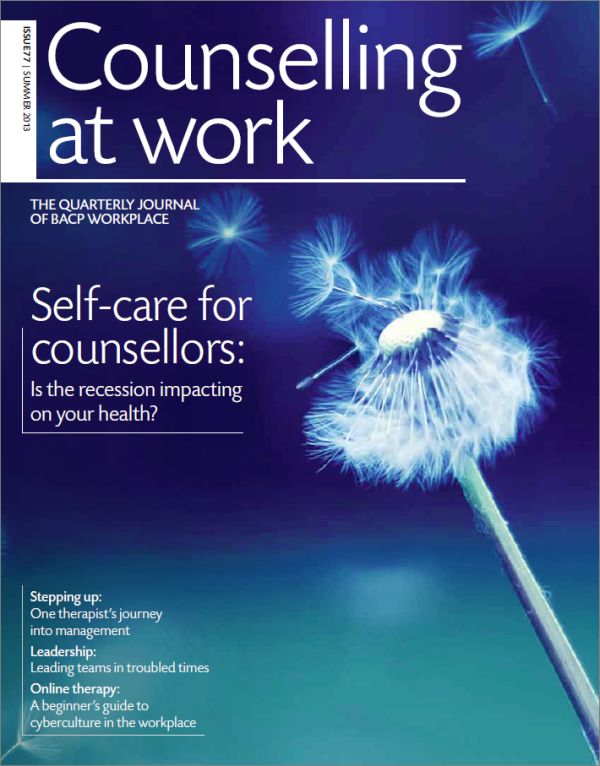In this issue
Becoming a resilient practitioner
Is the recession impacting on your health? Sally Despenser explores the risks for counsellors and outlines the case for good self-care
Practical resilience
Dr Chris Johnstone identifies ways to develop more resilient relationships
Stepping up
Steffi Bednarek unravels the complex dynamics and power relations involved when you become manager to your former peers
Leading teams in troubled times
How do you show leadership and maintain team health in tough times? Mandy Flint and Elisabet Vinberg Hearn share their expertise
Inside the organisation
Andrew Kinder, recently appointed Chair of the UK Employee Assistance Professionals Association, talks about the challenges facing our profession
Cyberculture in the workplace: a beginner’s guide
Would you embrace non-traditional ways of working? Dr Kate Anthony explores the use of technology in therapy in her new column
In-house vs outsourced provision
Amanda Smith debates the issues and weighs up the pros and cons
From the chair

Articles from this issue are not yet available online. Divisional members and subscribers can download the pdf from the Counselling at Work archive.
First words
‘In order that people may be happy in their work, these three things are needed: they must be fit for it, they must not do too much of it, and they must have a sense of success in it.’ Wise words indeed, written I discovered, by the British social reformer John Ruskin back in 1851. Quoting them in his foreword to the UK Employee Assistance Professionals Association (EAPA) EAPA Guidelines, Professor Cary Cooper presented this as the challenge that we workplace specialists now face1. This led me to ponder much about our clients’ work, our work as therapists and how we rise to this challenge in the current climate.
Recent conversations with colleagues have left me with a distinct sense that for those of us who are in the business of hearing pain, we have most likely been hearing more of it since the economic downturn. An increase in debt and mental health issues have led to Mind and MoneySupermarket.com joining forces to raise awareness of the link between finances and mental health2. ‘Recession depression’ in Therapy Today3 recently explored what counsellors across the country were witnessing and the impact on the nation’s mental health. Our clients may be in work, but their colleagues, partners or spouses may be facing redundancy or job insecurity which is likely to increase anxiety and decrease wellbeing. Workplace counselling is providing essential support when there are cuts to mental health services and when it is harder to find agencies to which to refer clients who have more complex mental health needs.
And so to return to Ruskin’s words… but this time as three questions: are we fit for work? Are we doing too much of it? And do we have a sense of success in it? I welcome Sally Despenser’s timely article in which she explores the risks for therapists who are at ‘the coal face’ working with clients as the impact of the recession continues to be felt. The message is clear: a greater awareness of our own needs and the shadow side of our work is essential to stay fit to work within this climate.
Continuing with the theme of resilience, I welcome back Chris Johnstone for his second article in the series ‘Practical resilience’. There is much about teams and leadership in this issue and so this time Chris homes in on how we can contribute to shaping the emotional landscape at work to make our relationships more resilient. He offers some fascinating insights and strategies to share with clients and teams going through ‘a rocky patch’.
There is no shortage of material on managing people. But, I learnt, there is surprisingly little research into how to manage your former colleagues when you become ‘the boss’. A warm welcome to Steffi Bednarek, the manager of a university counselling service, who explores this in her article ‘Stepping up’. She addresses the particular complexities involved and the challenging power dynamics at play.
When an email landed in my inbox about a new business book4 for leaders, written as a story, about a team who found its way, I found myself intrigued. The book’s authors, and experts in leading and developing teams in business, Mandy Flint and Elisabet Vinberg Hearn, talk to Counselling at Work this issue about what it takes to lead teams in uncertain times.
We hear from two voices from within the EAP community. The first is Andrew Kinder, our interviewee for ‘Inside the organisation’. Andrew is a past Chair of BACP Workplace and an executive committee member. The new Chair of UK EAPA, Andrew outlines his priorities and the challenges facing our profession. Innovation and technology, he explains, will play a key role in how therapy is provided in the future.
Opening our eyes to this, I’m excited to introduce Kate Anthony, a leading expert in online therapy, who begins her new series ‘Cyberculture in the workplace: a beginner’s guide’. She has trained practitioners and organisations worldwide and is committed to the development of ethical practice in this fast-growing field. Get ready for the journey.
And finally, we hear from Amanda Smith, our second voice from the EAP community, who debates the pros and cons of in-house counselling versus outsourced provision. Amanda explores the considerations for counsellors when thinking about their career pathways and looks at the dilemmas which can ensue.
My thanks go to all the contributors. I hope you enjoy this summer issue. Until the autumn …take care.
Nicola Banning
Editor
Counsellingatwork.editorial@bacp.co.uk
References
1 EAP Guidelines 2012. UK Employee Assistance Professionals Association. www.eapa.org.uk.
2 BACP Political Monitoring Briefing. Debt and mental health. 20.05.2013.
3 Brown S. Recession depression. Therapy Today. 2012; 23(10):12-15.
4 Flint M, Vinberg Hearn E. The team formula, a leadership tale of a team who found their way. London: MX Publishing; 2013.
